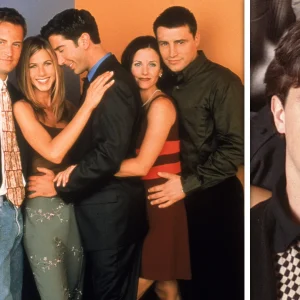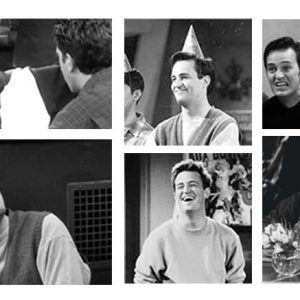Perusing the “Friends” star’s film resume is quick — and painful. There’s “Six Days Seven Nights,” “The Laundromat” and “Madagascar 3: Europe’s Most Wanted,” among other screen non-classics.
But the actor’s undeniable charisma and uniqueness are finally put to proper full-length use in the demented “Little Death,” which has its world premiere Friday night at the Sundance Film Festival.
He’s terrific. The problem is there is not enough of him in it.
Schwimmer plays Martin Solomon, a whiny but likable misanthrope like Larry David on “Curb Your Enthusiasm” or Ignatius J. Reilly from the novel “A Confederacy of Dunces,” who begrudgingly writes on a cheesy NBC sitcom called “The Switch.”
Martin hates his life and tells us as much over and over. “No hobbies, no children, no purpose,” he bemoans in one of his many “poor me” narrations. The frowning man rails against Hollywood wokeness, downs buckets of depression meds, loathes his fiancée and fantasizes about a beautiful woman who keeps appearing in his dreams.
He imagines his little Chihuahua in a blender. Messed up stuff.
When Martin miraculously finds an investor for his indie movie — a high-on-his-own-supply project about existentialism — he’s crushed when his agents tell him that the one condition for the funding is that the male protagonist must be rewritten as a woman.
“Nobody wants to watch another white guy with problems! Yuck,” one agent says in that cynical, fake-righteous Hollywood way. Hilarious.

Here’s when things get weird.
For the next several scenes of “Little Death,” in reference to the gender change-up, Martin is instead played by actress Gabby Hoffmann.
By this time, director Jack Begert has conditioned us to expect the visually unexpected. What sets his film apart from other stories of middle-aged Los Angeles cranks is the way reality is blurred by turbulent animations and CGI to express Martin’s roiling brain.
But Hoffmann stepping into Martin’s shoes is still a shock to the system. Schwimmer does return to “Little Death,” but only for a little bit.
Because after that, the polar-opposite second half of the film is about two twenty-something best friends, played by Dominic Fike and Talia Ryder, who are on a late-night mission through LA to recover their stolen car after a house robbery gone wrong.
The story of their journey is connected to Martin’s, however loosely, but the shared theme is that of addiction.

All of the off-the-wall visual elements from Part One — at the premiere, Begert called them “bells and whistles” — slip away, and what commences is a more familiar film that audiences have seen many times before.
How often have we watched young friends go door-to-door at night in search of something while meeting colorful characters along the way? “Booksmart,” “Superbad,” the 2022 Sundance film “Emergency” and plenty of others have done the same thing with sharper focus.
The casting, however, help keep the antics fresh. Ryder and Fike seem innocent at first but reveal an edgy danger as they hurdle forward. Karl Glusman plays against type as a quiet, nerdy drug dealer whose apartment is stark white and totally empty save for a snow globe. And newcomer Sante Bentivoglio is a fantastic find as their hysterical, burnout buddy Greg.
“Little Death” is an intriguing feature debut from director Begert, who previously plied his trade in music videos for the likes of Olivia Rodrigo, Doja Cat and Kendrick Lamar. That same career path worked wonders for David Fincher and Michel Gondry.





